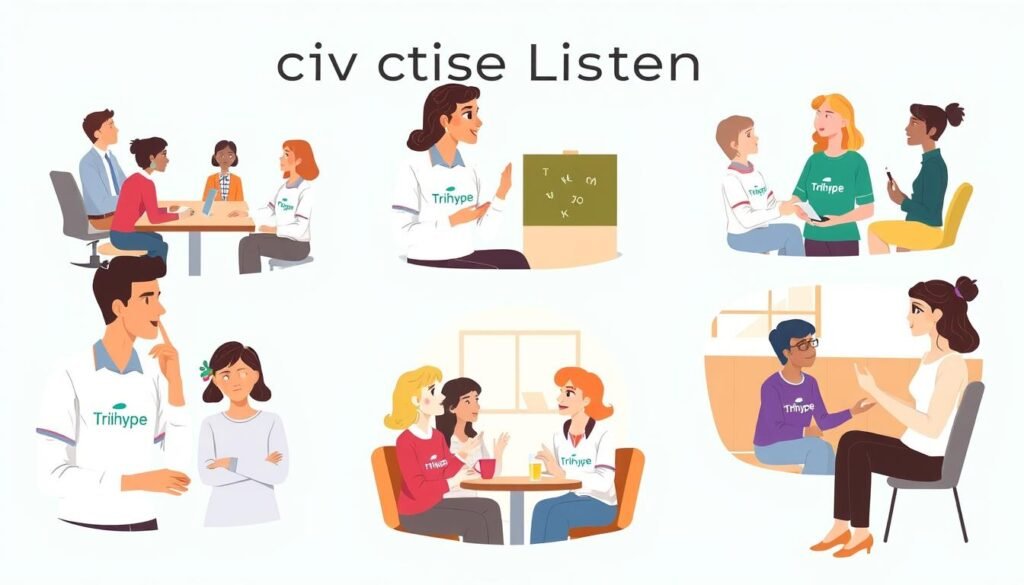Did you know most people only remember 25% of what they hear? This fact shows how crucial it is to get better at active listening. We’ll share top strategies and expert advice to boost your listening skills. By improving your listening, you’ll get better at communicating, build stronger relationships, and succeed more in life and work.
Key Takeaways
- Discover the difference between hearing and truly listening
- Learn techniques to eliminate distractions and focus on the speaker
- Develop empathy and emotional intelligence to connect with the speaker’s perspective
- Practice mindfulness and presence to enhance your active listening abilities
- Overcome common listening barriers and improve your concentration skills
The Importance of Active Listening in Effective Communication
Effective communication is key to doing well in both our personal and work lives. At the core of this skill is active listening. When we listen actively, we show respect and genuine interest in what others say. This makes us understand each other better.
It’s not just about hearing words. It’s about really connecting with the message and what it means.
Why Active Listening is Crucial for Personal and Professional Success
Active listening can change our relationships and improve our work performance. It helps us build trust and empathy. It makes people feel heard and important.
In work settings, it boosts teamwork, problem-solving, and decision-making. This leads to better results and stronger teams.
Understanding the Difference Between Hearing and Truly Listening
It’s key to know the difference between hearing and listening. Hearing is just taking in sounds. Listening is actively understanding what’s being said.
Listening well means focusing, being present, and really wanting to get what the speaker is saying. It’s about understanding their feelings and goals.
- Hearing is a passive process of perceiving sounds.
- Listening is an active process of comprehending and engaging with the message.
- Active listening involves focus, presence, and a genuine desire to understand the speaker.
“The most important thing in communication is to hear what isn’t being said.” – Peter Drucker
By using active listening, we improve our communication skills. We build stronger relationships and set ourselves up for more personal and professional success. This skill helps us understand others better and be understood ourselves.
How to improve active listening skills
Improving your active listening skills takes practice and dedication. But, the benefits are huge. By getting better at active listening, you can improve your communication, deepen relationships, and achieve more in life and work.
We’ll look at key strategies and techniques to help you listen better. These tips will show you how to focus and understand others better. They’ll change how you connect with people and take in information.
Eliminate Distractions and Focus on the Speaker
To be a good listener, you need to focus and stay present. This means turning off your phone, closing your laptop, and making a space for full attention.
- Turn off notifications and silence your devices to minimize interruptions.
- Avoid multitasking or letting your mind wander to other topics.
- Make eye contact with the speaker and pay attention to their nonverbal cues.
Practice Mindfulness and Presence
Being mindful and present is key to active listening. By quieting your thoughts and fully engaging with the conversation, you understand the speaker better and respond well.
- Take a few deep breaths before the conversation to center yourself.
- Resist the urge to think of your response while the other person is speaking.
- Notice your thoughts and feelings without judging them, and focus on the speaker.
Working on your active listening skills can change your life. By using these strategies, you’ll become more attentive, caring, and effective in how you communicate.
Eliminate Distractions and Focus on the Speaker
Active listening means you must get rid of distractions and focus on the speaker. It’s key for good communication and understanding each other.
Creating an Environment Conducive to Active Listening
To eliminate distractions and create a listening environment, try these tips:
- Turn off your phone and close apps you don’t need. Make sure the area is quiet and free from distractions.
- Stay in the moment by practicing mindfulness. Don’t let your mind drift off.
- Make sure you’re sitting comfortably with good lighting and the right temperature.
- Clear your space of things that might distract you.
- Prepare by taking deep breaths and being open to the conversation.
By making your space better for listening, you’ll get better at focusing on the speaker. This will make your conversations more meaningful. Regularly practicing active listening will boost your communication skills.
“The greatest gift you can give another is the purity of your attention.”
– Richard Moss
Practice Mindfulness and Presence
Cultivating mindfulness and being present in the moment are key to active listening. Being mindful helps us focus better and understand others more deeply. We’ll look at exercises and techniques to make you more attentive and present.
Mindfulness is more than just a trend. It’s a powerful way to improve how we listen. When we’re mindful, we focus fully on the moment. We ignore distractions and listen carefully to what’s being said. This lets us catch the subtle details, like the speaker’s tone and body language.
- Start with simple breathing exercises. Take a few deep breaths, focusing on the sensation of air moving in and out. This can help center your mind and calm your thoughts.
- Engage in a body scan. Slowly bring your attention to different parts of your body, noticing any sensations or tensions. This heightens your awareness of the present moment.
- Practice focused attention. Choose a single point of focus, such as a candle flame or the sound of your own breathing, and gently redirect your mind whenever it begins to wander.
Adding these mindfulness practices to your listening routine helps you stay present, focus on the speaker, and truly understand their message. Mindfulness is the key to deep, engaged listening. It leads to stronger connections and more meaningful conversations.

“Mindfulness is the foundation for deep, engaged listening that fosters stronger connections and more meaningful conversations.”
Nonverbal Cues and Body Language in Active Listening
Listening well is more than just hearing words. It means paying attention to nonverbal cues and body language too. These can tell us a lot about what the speaker feels and thinks. They help us be more empathetic and engaged.
Reading and Responding to Nonverbal Communication
Nonverbal cues like facial expressions, gestures, and posture tell us a lot. They show the speaker’s thoughts, feelings, and attitudes. By noticing these cues, we can understand the message better and respond in a way that connects.
If someone is fidgeting or avoiding eye contact, they might be feeling uneasy. On the other hand, a confident posture shows they’re open and ready to talk. By picking up on these cues, we can make our conversations more effective and meaningful.
| Nonverbal Cue | Potential Meaning | How to Respond |
|---|---|---|
| Crossed arms | Defensive or closed off | Suggest a relaxed, open posture to encourage more openness |
| Lack of eye contact | Disinterest or discomfort | Gently encourage the speaker to make eye contact, or adjust your position to facilitate better eye contact |
| Fidgeting | Nervousness or distraction | Offer a calm, reassuring presence and avoid interrupting the speaker |
Getting better at reading nonverbal cues makes listening more engaging and productive. It helps us connect better, understand more, and communicate more effectively.
Ask Clarifying Questions and Paraphrase
Listening well is key to understanding each other and building a strong connection. Asking questions and paraphrasing what the speaker says are great ways to do this. These methods show we care, help us get the full story, and make sure we understand what’s being said.
Techniques for Ensuring Understanding and Engagement
When someone shares something, it’s smart to ask clarifying questions. This confirms we get it and helps us get more details. It shows we’re paying attention and helps avoid misunderstandings.
It’s also key to paraphrase what the speaker says. By rephrasing the key points in our words, we show we’ve really listened. This makes sure we understand and lets the speaker check if we got it right, making our conversation better.
- Ask open-ended questions to encourage the speaker to elaborate and provide more context.
- Paraphrase the speaker’s main ideas to confirm your understanding and show your engagement.
- Avoid interrupting the speaker and instead wait for natural pauses to interject with your clarifying questions or paraphrasing.
- Actively listen to the speaker’s responses to your questions and paraphrasing to further enhance the dialogue.
Using these active listening engagement methods makes our talks more trustworthy and respectful. It helps us connect better and improve how we talk to each other.

Develop Empathy and Emotional Intelligence
Active listening is more than just hearing words. It’s about building empathy and emotional smarts to connect deeply with others. These skills help us make strong connections and communicate well.
Connecting with the Speaker’s Perspective and Emotions
When we listen actively, we focus on the speaker’s thoughts, feelings, and experiences. We try to see things from their point of view. This helps us understand their emotions better and show empathy.
Emotional intelligence lets us handle our feelings and those of others. It helps us notice and understand the emotions in a conversation. This way, we can answer with care and emotional insight.
- Actively listen to the speaker’s tone, body language, and facial expressions to pick up on emotional cues.
- Reflect on how the speaker’s words and experiences might make them feel, and consider how you would feel in their shoes.
- Respond with empathetic statements that demonstrate your understanding of the speaker’s perspective and emotions.
By growing empathy and emotional smarts, we make a stronger bond with the speaker. This builds trust, understanding, and leads to deeper conversations.
“The greatest gift you can give another is the purity of your attention.”
– Richard Moss
Active Listening in Conversations and Meetings
Good communication is key to success, whether in everyday chats or formal meetings. To really connect and make a difference, we need to get good at active listening. This skill means more than just hearing words. It’s about being fully there, interested, and reacting to what’s said.
In everyday talks, active listening helps us form deeper bonds and understand others better. We do this by keeping eye contact, asking smart questions, and repeating back what we heard. This shows we care and makes our conversations more meaningful.
In meetings, we need to pay even closer attention. Active listening helps us grasp the main goals, catch crucial details, and give valuable feedback. By really getting into the discussion, we get a better grasp of things and help the meeting go well.
- Keep eye contact and avoid distractions to show you’re fully there.
- Ask questions to make sure you get the main ideas and views.
- Repeat back what you heard to show you’re listening and understand.
- Answer with empathy and emotional smarts, thinking about how the speaker feels and the situation.
Getting good at active listening is key for talking well in all parts of life. By improving this skill, we can make stronger connections, add more to discussions, and do better in what we do.

“The greatest gift you can give another is the purity of your attention.” – Richard Moss
Overcoming Barriers to Effective Listening
Listening well is a skill that needs practice and effort. Even those who are good at listening can face challenges. This section will look at common listening problems and how to beat them. It will help you listen better and understand others more deeply.
Identifying and Addressing Common Listening Challenges
One big problem with listening is getting sidetracked by things around us or our own thoughts. Overcoming listening barriers starts by noticing these distractions and focusing on the speaker.
- Turning off distractions like background noise or digital devices helps us pay attention better.
- It’s important to stop thinking about what to say next or judging what the speaker is saying. This helps us listen better.
Another issue is making assumptions or jumping to conclusions based on what we already think we know. Being open and curious helps us get past these biases. This lets us really listen to what the speaker has to say.
| Common Listening Challenges | Strategies for Overcoming Them |
|---|---|
| Distractions (external and internal) | Eliminating environmental distractions, managing internal dialogue |
| Assumptions and biases | Cultivating an open and curious mindset |
| Lack of empathy and emotional intelligence | Developing empathy and understanding the speaker’s perspective |
| Poor communication habits | Practicing active listening techniques, such as asking clarifying questions and paraphrasing |
Being able to understand and feel what the speaker is going through is key to overcoming listening barriers. Developing emotional intelligence helps us connect better with others. This makes our conversations more meaningful and effective.
To improve listening skills, we need to be willing to face and solve these common active listening obstacles. By using strategies to get past them, we can listen more deeply and respond better. This makes our relationships better, both at work and in our personal lives.
Active Listening in Various Contexts
Effective communication is key in our daily lives, from personal to professional settings. At the core, active listening is a vital skill. It helps us navigate different interactions with ease and understanding. Adapting your listening techniques for various situations makes communication better.
Adapting Your Listening Skills for Different Situations
Active listening is useful in many situations. It’s important whether you’re chatting with friends, in a business meeting, or discussing something personal. Being able to listen and respond well can greatly impact your interactions.
In personal relationships, active listening means being fully present and empathizing with others. It also means asking questions to understand better. This strengthens bonds, builds trust, and helps solve conflicts.
In work settings, like meetings or negotiations, situational listening is crucial. By listening to colleagues or clients, you understand their views and needs. This helps you respond better, leading to more successful outcomes.
No matter the situation, versatile listening strategies are key. Being able to listen and respond well in different situations boosts your communication skills. It helps you handle various interactions with confidence.

Effective active listening isn’t a one-size-fits-all method. By tailoring your listening to each situation, you become a more dynamic communicator. This leads to stronger relationships and better outcomes.
Continuous Improvement and Practice
Mastering active listening is a journey that never ends. It takes dedication and constant effort. To get better at communicating, you need to keep growing and make listening a part of your daily life.
Regular active listening practice helps you get better at listening. By always trying to improve, you’ll understand people better and grow personally and professionally.
- Make time each day for active listening exercises. This could be paraphrasing talks, paying attention to body language, or listening to podcasts.
- Ask people you trust for feedback to see where you can get better. Then, make a plan to work on those areas.
- Think about how you’re doing, celebrate your wins, and change your approach when needed to keep getting better.
Seeing learning as a lifelong journey is key to getting good at active listening. By always working on your skills, you’ll talk better and connect deeper with others.
“The art of listening is essential to effective communication and the foundation of all meaningful relationships.”
Continuous improvement and hard work are what make a great active listener. Start this journey, and you’ll see your relationships get better at work and in life.
| Skill | Description | Benefits |
|---|---|---|
| Paraphrasing | Restating the speaker’s message in your own words to ensure understanding. | Demonstrates active engagement, clarifies ambiguities, and builds trust. |
| Nonverbal Cues | Observing and responding to the speaker’s body language, facial expressions, and tone of voice. | Provides deeper insight into the speaker’s emotions and enhances empathy. |
| Focused Listening | Eliminating distractions and fully concentrating on the speaker’s message. | Improves comprehension, retention, and the ability to provide thoughtful responses. |
Effective communication skills and Empathetic Listening
Active listening is more than a skill for work. It’s a key way to make our personal relationships stronger. When we listen with empathy and really want to understand others, we build trust. This helps us connect more deeply and form meaningful bonds.
Building Stronger Relationships Through Active Listening
Good communication skills, based on empathetic listening, are key to strong relationships. By listening actively, we show we care about what others think, feel, and go through. This builds trust, making it easier for people to share more with us.
Also, active listening helps us get what the other person is saying. When we really listen, we can answer in a way that shows we get their feelings and needs. This makes our connections deeper and makes us feel understood.
- Cultivate empathy and emotional intelligence to connect with others on a deeper level.
- Eliminate distractions and focus solely on the speaker, demonstrating your undivided attention.
- Ask clarifying questions and paraphrase to ensure mutual understanding and engagement.
By improving our active listening and being empathetic, we can make our relationships stronger. This makes our personal and work lives richer.

“The most important thing in communication is to hear what isn’t being said.” – Peter Drucker
Focused Listening Practice and Concentration Exercises
Learning to focus and concentrate is key to being a great listener. We’ll look at exercises and techniques to boost your concentration and listening skills.
One great exercise is focused listening practice. Choose a quiet spot with no distractions. Talk to a friend or family member. Your job is to listen carefully, not interrupt, and then share the main points they said. This helps your brain ignore distractions and focus on the speaker.
- Try concentration exercises like the “memory game.” Listen to a list of items, then try to remember them all. Increase the list size to make it harder.
- Improve your active listening by repeating what the speaker said in your words. It shows you’re paying attention and understand them.
- Do cognitive skills development exercises like mindfulness meditation. It helps you stay focused and present in talks.
Adding these exercises to your daily life will help you develop the focus needed to be an amazing listener. These practices aren’t just for better talking – they also boost your thinking and decision-making skills.
Active Listening in the Workplace and Professional Settings
In today’s fast-paced business world, effective communication is key to success. Active listening is a skill that can boost your work performance. It means more than just hearing words; it’s about understanding the speaker’s message, feelings, and what they really want to say.
Active listening shows respect and builds trust with your coworkers. It leads to better meetings, teamwork, and job happiness. By improving your listening skills, you can grow in your career and work better with others. This makes the workplace more positive and open.
Strategies for Active Listening in Professional Settings
- Turn off distractions and focus on the speaker. Don’t multitask or let your mind drift.
- Notice nonverbal signals like body language and facial expressions to understand the speaker better.
- Ask questions and repeat back what you heard to make sure you got it right.
- Be empathetic and try to see things from the speaker’s point of view.
- Stay in the moment and avoid thinking about your response too early.
Using these tips can improve your listening skills. This makes you a better communicator at work. It helps your career and makes your workplace more successful.
“The biggest problem in communication is the illusion that it has taken place.” – George Bernard Shaw

Active listening is more than a skill; it’s a way of thinking. By really wanting to understand and connect with your coworkers, you can improve your work communication. This can take your career further.
Mindful Listening Habits for Everyday Life
Developing mindful listening habits changes our daily life, touching our personal and work relationships. By using active listening every day, we make deeper connections and feel better overall.
Key to mindful listening is staying in the moment. Don’t let your mind stray or think ahead. Focus on the speaker to really get what they’re saying and respond with care.
- Turn off distractions and don’t multitask when talking.
- Keep eye contact and open body language to show you’re listening.
- Wait to think of your reply while the other is still talking.
Regularly practicing mindful listening habits makes our relationships stronger and our connections deeper. By listening well, we show respect, build trust, and understand each other better.
| Mindful Listening Habit | Benefit |
|---|---|
| Maintaining eye contact | Shows you’re really paying attention |
| Asking clarifying questions | Helps make sure you get the message |
| Paraphrasing key points | Shows you’re actively listening |
| Suspending judgment | Creates honest and open talk |
By making active listening a part of daily life, we boost our personal and work relationships. We get better at talking to others and live more satisfying and connected lives.
“The greatest gift you can give another is the purity of your attention.” – Richard Moss
Overcoming Listening Barriers and Enhancing Attentive Listening
Good communication is key to success in both life and work. Active listening is a big part of this. But, even with the best intentions, we can face barriers that make it hard to listen well. We’ll look at ways to beat these obstacles and tips to help you listen better.
Identifying Listening Challenges
First, we need to know what gets in the way of our listening. Common hurdles include:
- Internal distractions (e.g., mental chatter, personal worries)
- External distractions (e.g., noise, sights, tech)
- Lack of emotional connection or empathy
- Jumping to judgment or making assumptions
- Struggling to stay focused
Strategies for Overcoming Listening Barriers
After spotting your listening hurdles, you can start using strategies to beat them. Some good methods are:
- Practicing mindfulness and staying in the moment: Focus on now to reduce internal distractions and connect better with the speaker.
- Reducing external distractions: Make a good listening space by cutting down on noise, sights, and tech interruptions.
- Building empathy and emotional smarts: Try to get the speaker’s view and feelings to engage more and respond with care.
- Asking clarifying questions and paraphrasing: This helps make sure you get the message right and shows you’re really listening.
Using these strategies, you can get past listening barriers. This makes you a better listener, improving your personal and work relationships.
“The most basic and powerful way to connect to another person is to listen. Just listen. Perhaps the most important thing we ever give each other is our attention.” – Rachel Naomi Remen
Conclusion
Mastering active listening skills changes everything. It opens up new worlds for both personal and professional development. By using the tips and techniques from this guide, you’ll become better at understanding others. This leads to deeper connections, more productivity, and more success.
Being able to listen well is key to effective communication. It’s important for our personal and work lives. By improving this skill, we can make stronger relationships, solve problems better, and understand others’ feelings and thoughts.
As we keep learning, let’s not forget how powerful active listening is. By really listening to others, we open up new chances for growth. This skill can lead to a more fulfilling and successful future. Let’s embrace it and see where it takes us.
